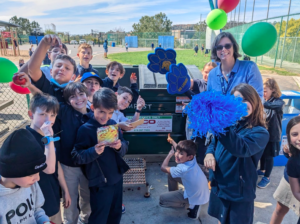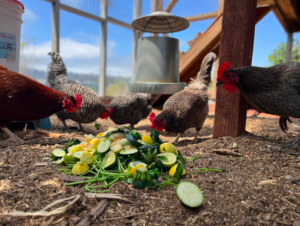SAN DIEGO (Press Release) — San Diego Jewish Academy (SDJA), a pluralistic community K-12 school with a thriving early childhood center, marked a major milestone in the school’s ambitious Sustainability Initiative (SI), celebrating the success of the school’s food waste diversion program that is currently diverting thousands of pounds of food waste each week from the landfill.

SDJA offers a campus community dining program that provides nourishing meals to approximately 750 people daily. With an onsite kitchen and dining program comes food waste; that is something the state of California is trying to curb through SB 1383. The state has a goal of diverting 75% food waste by 2025. SDJA is currently diverting 100% of the organic waste from the school’s kitchen. The program goes beyond mere waste management by providing valuable educational opportunities for the students, creating operational efficiencies, fostering innovative partnerships, exploring potential AI-enabled tools to curb waste at its source, and, most importantly instilling a sense of responsibility and promoting sustainable practices for the community at school and beyond.
“One third of the local landfill is food waste, yet many San Diegans face food insecurity,” says Joanna Dubbeldam, SDJA’s Director Sustainability and the creator of this innovative program. “SDJA donates all edible food that we don’t use to our food recovery partner, Jewish Family Services, which distributes food to unsheltered San Diegans living out of their vehicles through JFS’s Safe Parking Program. Kitchen discards and inedible leftovers are separated and turned into animal feed by local farmers or fed to the school’s chickens and garden compost bin. All remaining organic waste from the dining program is hauled away and processed into biofuel at a local aerobic digester.”

“In collaboration with our dedicated faculty, we’re cultivating educational connections around how to reduce our environmental impact and integrating learning opportunities that create character development parallel to academic excellence and expression of Jewish values for students of all ages as well as the community. Each one of us can create great impact with our simple choices. If our students strive to be change-makers in the world, then we can rest assured that we have a bright future ahead,” Dubbeldam continues.
California’s SB 1383 requires commercial businesses, including schools, to maintain commercial recycling and organic recycling programs. Starting in January 2024, Tier2 businesses, which includes schools, are required to have a food recovery program. SDJA is far ahead of the curve and has been described as a “model school” by Kayla Thomson, Senior Food Procurement Supervisor from San Diego Food Bank’s food rescue program.
“SDJA’s Sustainability Initiative shows how we are rooted in Jewish values, namely bal tashchit, to protect the earth,” said Zvi Weiss, Head of School at SDJA. “We are a stronger community when we work together to create meaningful impact.”
*
Preceding provided by San Diego Jewish Academy
It is a wonderful thing you are achieving.